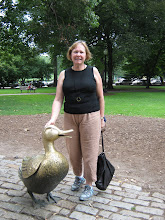
Old Mother Goose,
When she wanted to wander,
Would ride through the air
On a very fine gander.
Jack's mother came in,
And caught the goose soon,
And mounting its back,
Flew up to the moon.
At school we have celebrated Mother Goose Day before. I have a talking Mother Goose plush toy which recites nursery rhymes and as a prep school library that caters for 3 to 8 year olds we have quite a few anthologies of nursery rhymes. These are not borrowed by parents or children. The parents all think their children are past that and that nursery rhymes are for babies. I find this sad, because the students I teach do not know their nursery rhymes, beyond Twinkle Twinkle Little Star; Humpty Dumpty; Incy Wincy Spider; Little Miss Muffet; and Baa Baa Black Sheep. If I say the opening lines of many others, they can't always finish them.
This year I decided to put together a display for Mother Goose Day of nursery rhyme mashup stories, that is stories that have characters from nursery rhymes but not the usual words. Then when parents borrow these to read with their child, perhaps through discussion they will realise their child does not know the original rhymes and will then come back to the library looking for books that give the original rhymes and further verses beyond what they know. I would love it if they knew The Grand Old Duke of York; Cobbler Cobbler; Hickety Pickety; Hickory Dickory Dock; Sing a Song of Sixpence and many more.Of course there are preschool children who do know them and they are very good at completing rhymes, predicting rhyming words and are well on their way to reading.
When I started to collect books together for the display I found the library had 94 books with 'nursery rhyme - fiction' as a subject heading so it wasn't hard to find suitable reading material for my audience. Here is a pinterest page of what I found.

















